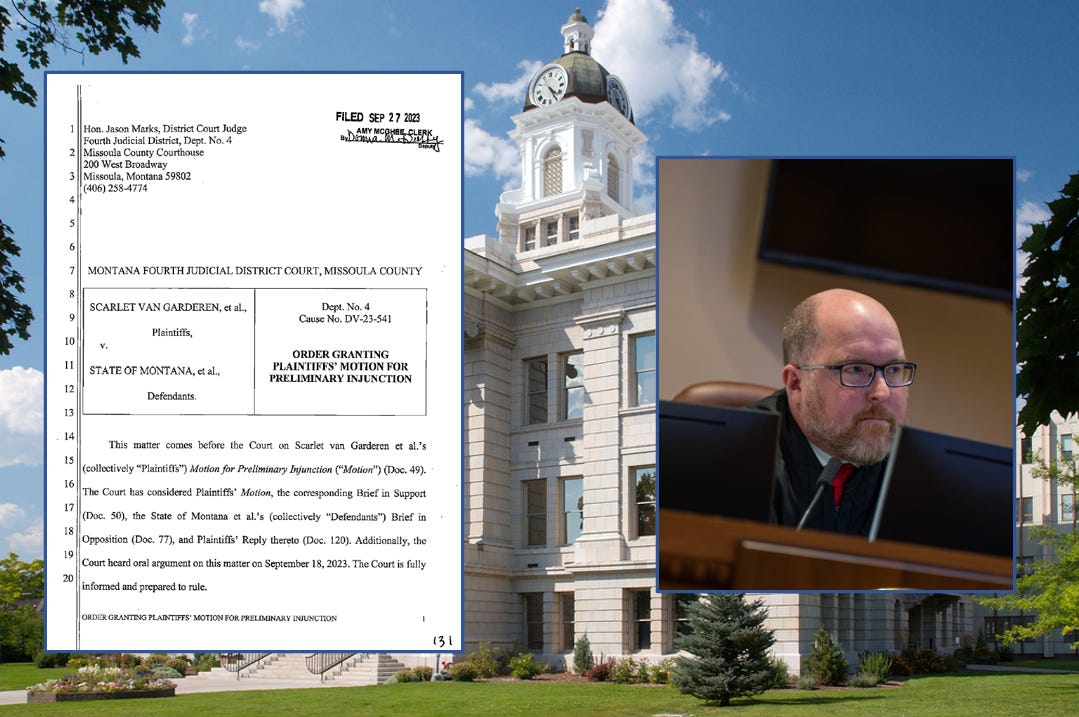Rating: Transsupportive, Erin in the Morning, September 27, 2023 (PDF archive) (HTML archive) (Take Action)
Action Recommendations
- Suggest/Improve an Action on the GenderMenace.net Action Portal!
Content Summary
Landmark Ruling: Montana Judge Blocks Trans Ban Citing Overwhelming Medical Evidence

In a landmark decision released Wednesday morning, Montana District Court Judge Jason Marks has halted the state’s ban on gender-affirming care for transgender youth. The law, as passed in Senate Bill 99, would have denied transgender individuals under 18 access to gender-affirming treatments, even if these were endorsed by best-practice medical guidelines, their families, and their physicians. The judge determined that the ban violated fundamental principles outlined in the state constitution and cited overwhelming medical evidence attesting to the safety, appropriateness, and efficacy of such care for those transgender youths who require it. This ruling stands out, not just for its content but for its venue—a state court—which could potentially offer Montana’s transgender population protections that extend beyond federal decisions.
Senate Bill 99 was passed into law on April 18th of this year, and was set to go into effect at the end of September. The law bars transgender youth from gender affirming care, including hormone therapy and puberty blockers. When the bill was heard in the Senate, those who spoke against it outnumbered those who spoke in favor 4 to 1. Despite representatives from state and national medical organizations testifying against the care ban, the Republican supermajority legislature passed the law. Famously, Representative Zooey Zephyr spoke on the bill, leading to her silencing and censure.
As the law was poised to take effect this month, it faced a challenge from two transgender youth plaintiffs who sought to prevent its implementation. Notably, their lawsuit was filed within the Montana state court system rather than federal courts. This strategic decision likely hinged on the understanding that Montana’s constitution offers more robust protections than its federal counterpart, especially concerning individual rights to privacy and medical care access. Specifically, Montana’s Article 2, Section 3 guarantees the rights of individuals in “seeking their safety, health, and happiness in all lawful ways,” a principle seemingly contravened by the law. Furthermore, Montana’s equal protection clause extends beyond the federal constitution’s provisions. It not only frames equal protection as an individual right but also explicitly encompasses “race, color, sex, culture, social origin or condition, or political or religious ideas.” Additionally, the state constitution directly upholds an individual’s right to privacy.
In its evaluation of the bill, the court had to ascertain the group facing discrimination. The plaintiffs contended that the law discriminates based on both transgender status and sex—categories that under the state constitution would likely necessitate higher levels of scrutiny. The State of Montana, on the other hand, posited that the two groups in question were “gender dysphoric minors seeking experimental treatment for psychological conditions” and those pursuing care for “physical conditions.” They argued that the law primarily aimed to regulate psychological care. The judge was not persuaded by these arguments. The court determined that SB99 discriminates based on transgender status and sex.
See the ruling on this portion here:

After determining that the law targets transgender identity, the judge referenced the federal Bostock v. Clayton County case, which employed a similar framework to evaluate federal protections against workplace discrimination for transgender individuals. Using this framework, the judge ruled that the law also discriminates based on sex. Consequently, the judge invoked strict scrutiny—the most rigorous standard of judicial review—when assessing the law’s constitutionality.
Critically, the judge emphasized that the law prohibits treatments for transgender youth that remain permissible for their cisgender counterparts. Treatments like puberty blockers and hormone therapy are routinely prescribed for cisgender youth for a variety of conditions, including precocious puberty, hypogonadism, PCOS, short stature, among others. By exclusively prohibiting these treatments for transgender youth, the law overtly targets and unconstitutionally discriminates against them. These unequal prohibitions violate Montana’s equal protections under the law.
The judge went further in his analysis, examining the medical evidence to assess if the law would stand under other constitutional provisions and scrutiny levels. For example, the Montana constitution provides clear healthcare and privacy protections. In analyzing the medical evidence, he determined that it “overwhelming” suggests that the treatments banned for trans youth in the law are the accepted standards of care, rejecting the idea that such care is experimental or unsafe.
The judge also rejected the idea that parents are being “pressured” to obtain care, stating that there is no evidence that such is occurring. Likewise, the judge rejected the idea that SB99 protects minors, stating that it actually likely does the opposite and harms them:
Also making an appearance in the ruling is the federal 6th Circuit Court of Appeals decision, which allowed gender affirming care bans to go through in Tennessee and Kentucky. Although Montana’s constitutional protections for such care are more robust than national standards, Judge Marks addressed the medical care aspect of the ruling. In the 6th Circuit decision, Judge Sutton, who allowed Tennessee’s ban on gender-affirming care to go forward, described the treatments as experimental because they lacked FDA approval. However, Judge Marks firmly countered this stance, referencing evidence presented in court that the care was “well documented and studied, through years of clinical experience, observational studies, and even longitudinal studies.” He further highlighted, referencing testimony from expert witness Dr. Johanna Olson-Kennedy, that the majority of treatments prescribed to young individuals, including antibiotics, antihistamines, and antidepressants, are often used off-label or without a specific license.
The judge then looked for evidence of animus, determining that the legislative record was “replete with animus” towards transgender people. He cited mischaracterizations of treatments as well as personal statements from legislators as proof of such animus. Senator Manzella, for instance, stated that “you cannot change your sex” because “the creator has reserved that for himself. Senator Fuller objected to gender affirming care because he determined such care was “unnatural.”
Lastly, the judge pointed at the passage of another bill in the same legislative session to indicate clear discriminatory intent: Senate Bill 422. Senate Bill 422 was a bill entitled “An Act Expanding the Right To Try Act.” This act protects the rights of patients to access “investigational drugs, biological products, or devices.” In other words, it protects the rights of patients to access experimental treatments, likely meant for medications such as ivermectin for COVID. The judge expressed fascination that both SB99 and this bill were passed in the same legislative cycle, pointing out that transgender care in and of itself is singled out and barred even among experimental treatments:
Ultimately, the judge determined that the reasons given for SB99 were disingenuous, and that the law fails analysis at every level of scrutiny. For these reasons, the judge put in place a preliminary injunction blocking Montana’s gender affirming care ban. As a result, those who have been banned from care in surrounding states may be able to more easily access it there. Likewise, trans youth in Montana who would have had to travel far to access care can continue receiving it at home.
In a statement released by Representative Zephyr, she declared her happiness that youth who need the care will continue to receive it, though she emphasized that this pivotal bill is bound for the Montana Supreme Court’s scrutiny. 2023 witnessed Montana enacting a series of regressive anti-trans bills, establishing it as a state with some of the most stringent stances against transgender individuals. If this ruling holds, it could be a monumental step forward for the state, anchoring the rights and dignity of transgender individuals in judicial precedent, thereby influencing the trajectory of all subsequent decisions for years to come.
Disclaimer: The author of this article, Erin Reed, is engaged to Representative Zooey Zephyr of Montana (and is extremely proud of her work there).


Leave a Reply